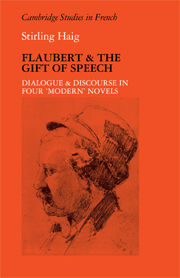Summary
If there are relatively few studies on the use of dialogue in the novel, it is because the problems of narrative, in the wake of the rediscovery of the Russian Formalists, have captured the critical imagination, and because innovations in the novel's technique – in Joyce and Proust, in Virginia Woolf and John Dos Passos – were in the domain of narration. And before Vladimir Propp's work provided a structural model that regenerated the study of all narrative and led in time to the approach we now term narratological, Anglo-American critics were concerned from the time of Henry James with problems of “point of view.” The critical landmarks are several, but the best known are no doubt Percy Lubbock's The Craft of Fiction (1921) and Wayne Booth's The Rhetoric of Fiction (1961). Refinements in our descriptions of how tales get told are to be found in Gérard Genette's long essay, “Discours du récit” (Figures III, 1972; translated as Narrative Discourse, 1983), now considered to be the standard discussion of narration.
Thus narration, and its handmaiden, description, seemed to be constitutive of the storyteller's art; the telling of the tale, the narrator's activity, has been the center of critical focus. Dialogue, problematic in its relation to real speech, seemed more naturally to belong to the study of the theater, and so to be the property and domain of another genre, one whose historical codifications often consigned it to poetry rather than prose – at least in Flaubert's day.
- Type
- Chapter
- Information
- Flaubert and the Gift of SpeechDialogue and Discourse in Four "Modern" Novels, pp. vii - viiiPublisher: Cambridge University PressPrint publication year: 1986

